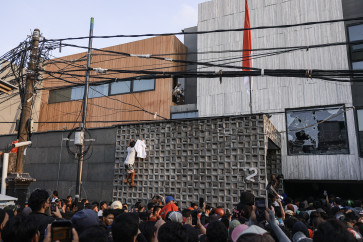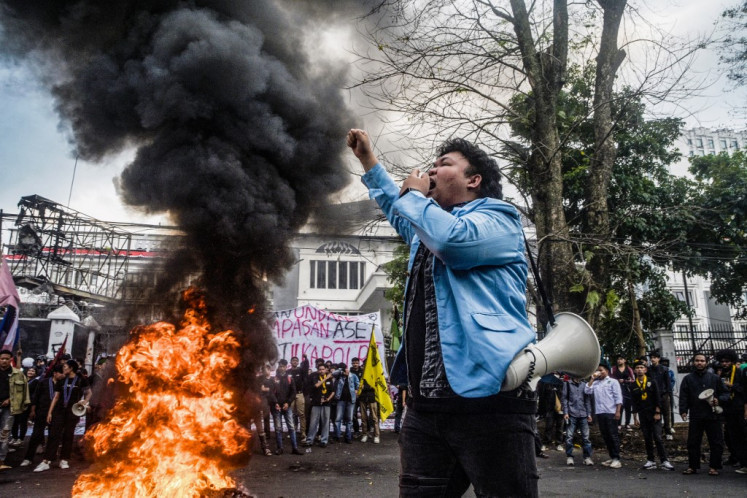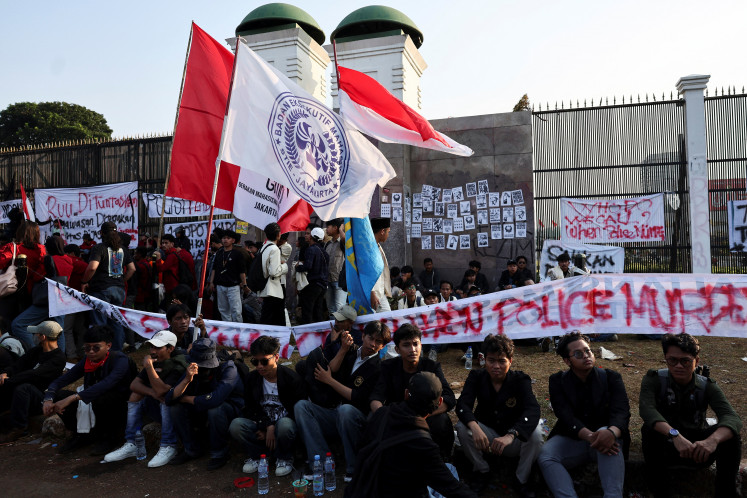Popular Reads
Top Results
Can't find what you're looking for?
View all search resultsPopular Reads
Top Results
Can't find what you're looking for?
View all search resultsWhy few women become UN peacekeepers
Line of duty: Indonesian peacekeeper Lt
Change text size
Gift Premium Articles
to Anyone
L
ine of duty: Indonesian peacekeeper Lt. Col. Revila Oulina (right) hands out sports equipment to children in an internally displaced persons camp in Sudan on Jan. 5, 2018.(Courtesy of Revila Oulina)
It was 2017 and Lt. Col. Revila Oulina was the only female Indonesian peacekeeper at her camp in Darfur. In the 40-degree heat of Al-Fashir, the capital of North Darfur, Sudan, she was on a yearlong mission as chief of civil-military coordination at the headquarters of the United Nations-African Union Mission in Darfur (UNAMID).
She longed for home in Jakarta, where her husband and two young sons were awaiting her return, but as the highest ranking female peacekeeper in a UN mission where only 3.6 percent of military personnel were women, she had an important role to fill.
“Women peacekeepers, perhaps because they are also mothers, sisters and daughters, connect with the local population,” said Anuradha Saibaba, a legal expert at the International Committee of the Red Cross’ regional delegation for South Asian nations. “We have seen an increased response of the local community to interact more when there are women peacekeepers and police around.”
Women constitute just under 6 percent of the total UN peacekeeping force today. The problem begins from the low proportion of female peacekeepers being deployed by troop-contributing countries, including Indonesia.
While the UN encourages countries to deploy a force that is at least 15 percent female, the number of women in Indonesia’s peacekeeping contingent hovers at just 4 percent, according to Lt. Gen. Joni Supriyanto, chief of general staff at the Indonesian Military. Joni expressed a commitment to raising the number to 10 percent on Wednesday at an international conference on peacekeeping in Jakarta.
The fear of sexual and gender-based harassment committed by peacekeepers against other peacekeepers might be one of the many reasons why the number of women involved in peacekeeping is so low. After family considerations, sexual and gender-based harassment is the most significant barrier to women's participation in peacekeeping missions, according to a July 2018 report by the Geneva Center for Security Sector Governance.
“We need to also acknowledge that peacekeepers, whether they are male or female, are equally at risk, not just for sexual violence, but for being attacked, kidnapped, or killed,” said Saibaba. For 13 months in Darfur, Revila had to be escorted by a male counterpart whenever she left the camp upon the insistence that it was for her safety.
At the peacekeeping conference this week, Jean-Pierre Lacroix, undersecretary-general for Peace Operations at the UN, called for countries to deploy more female officers and female generals in UN missions. AM Fachir, the Indonesian deputy foreign minister, echoed Lacroix’s sentiments in his keynote speech. “Modern armed forces should mean equal opportunity for women to join and advance through the ranks,” said Fachir.
But how soon this desire for more women in military leadership roles would translate into reality is another question.
For many female peacekeepers, leaving their families behind for up to a year during their deployment remains a major reason they may choose not to join a UN mission, even if offered the chance.
For now, there is still a long way to go. The fact remains that at the international conference on peacekeeping where the three keynote speakers — all men — emphasized a desire to see more female peacekeepers deployed on UN missions, Revila, Lt. Col. Amelia Farissa Devi and dentist Lily Damayanti were the only female Indonesian peacekeepers in attendance.
— The writer is an intern at The Jakarta Post.










